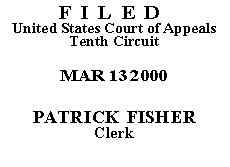

| CHRISTY D. MYERS,
Plaintiff-Appellant, v. YASH CHOPRA, M.D., Defendant-Appellee. |
|
Appellant contends that the jury's awards of $1.00 in nominal damages and $2.00 in punitive damages were inadequate to compensate her for emotional and mental injuries she sustained when appellee repeatedly fondled and squeezed her breasts while administering epidural anesthesia during her labor and delivery. Unfortunately, whether appellant's contentions are considered to be a challenge to the sufficiency of the evidence to support the jury's award, an assertion that the damages were so inadequate as to require a new trial, or a claim that the jury reached an impermissible compromise verdict, see Shugart v. Central Rural Elec. Co-op., 110 F.3d 1501, 1505 (10th Cir. 1997) (defining compromise verdict as one in which the jury is unable to agree on liability and compromises the disagreement by entering a low award of damages), the record before us indicates that appellant failed to preserve error by raising those issues before the district court after the jury reached its verdict.
It is a fundamental tenet that an appellate court reviews only those claims of legal error on which the trial court has first had an opportunity to rule. See Neu v. Grant, 548 F.2d 281, 286-87 (10th Cir. 1977).
The purpose for timely objection or motion as a precedent to review on appeal is two-fold. It provides the trial court with the opportunity to know the specific contentions and to take corrective action, if required. And--more importantly for appellate review--it does not permit a party to sit idly by, watching error being committed, and then take a "first" shot at the claimed error without having accorded the trial court the opportunity to correct its action.
Id. at 287. A claim that damages awarded by the jury were so inadequate as to require a new trial must first be brought to the trial court's attention in the form of a motion for new trial. We then review the court's ruling for abuse of discretion. See Mason v. Oklahoma Turnpike Auth., 115 F.3d 1442, 1457 (10th Cir. 1997). Appellant's failure to preserve error in this manner precludes our review. See Morrison Knudsen Corp. v. Fireman's Fund Ins. Co., 175 F.3d 1221, 1256 n.45 (10th Cir. 1999) (stating that plaintiff's argument that jury reached a compromise verdict was waived by failing to move for a new trial on that ground); Martin H. Redish, New Trials; Amendment of Judgments, 12 Moore's Federal Practice 3d § 59.55, at 59-136 (1999) ("Grounds for new trial that arise solely in the context of post trial proceedings must be presented to the trial court for consideration by a motion for new trial, and the failure to do so deprives the appellate court [of] any record that is reviewable for error.").
Entered for the Court
Circuit Judge
*. This order and judgment is not binding precedent, except under the doctrines of law of the case, res judicata, and collateral estoppel. The court generally disfavors the citation of orders and judgments; nevertheless, an order and judgment may be cited under the terms and conditions of 10th Cir. R. 36.3.
1. After examining the briefs and appellate record, this panel has determined unanimously that oral argument would not materially assist the determination of this appeal. See Fed. R. App. P. 34(a)(2); 10th Cir. R. 34.1(G). The case is therefore ordered submitted without oral argument.